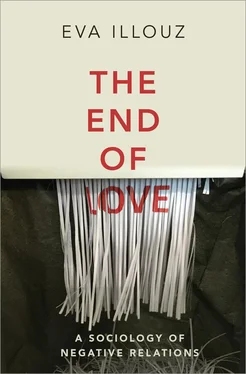1 Cover
2 Endorsement Praise for The End of Love “Eva Illouz presents a bleak but fascinating analysis of what the modern world has done to love … The great French novelist Honoré de Balzac said he wanted to be the historian of the human heart. The Franco-Israeli sociologist Eva Illouz might be called the historian of human heartbreak.” The Irish Times “Eva Illouz’s work combines theoretical sophistication with a sharp eye for what’s essential in contemporary culture. This singular blend has made her an intellectual star of the European world. The End of Love , the fruit of twenty years of reflection about the ways in which 21st-century emotions are inevitably bound up with consumer capitalism, will show American readers too why Illouz is one of the most important thinkers of her generation.” Susan Neiman, Director of the Einstein Forum “ The End of Love is a provocative new installment in Eva Illouz’s two decades-long interrogation of the relations between the modern idea of love and the cultures of capitalism. As contemporary capitalism thrives on dislocation, disruption, casualness, uncertainty, and precarity, Illouz draws attention to a corresponding morphing of sexual relations and inner life. Our contemporary culture, she shows, is suffused with practices of ‘unloving’, of quickly forming and dissolving intimate ties in a quest for selfempowerment understood as radical autonomy and the exercise of free choice. Written with passion, insight, and breathtaking scope, it is the best sociological examination of the disorganization of emotional life wrought by the capitalist market, consumer culture, and the paradoxes of freedom.” Gil Eyal, Columbia University
3 Title Page The End of Love A Sociology of Negative Relations EVA ILLOUZ polity
4 Copyright Originally published in German as Warum Liebe endet: Eine Soziologie negativer Beziehungen ©Eva Illouz 2018 © Suhrkamp Verlag Berlin 2018 All rights reserved by and controlled through Suhrkamp Verlag Berlin First published in the United States of America by Oxford University Press in 2019 English Translation © Oxford University Press 2019 This edition published by Polity Press 2021 Polity Press 65 Bridge Street Cambridge CB2 1UR, UK Polity Press 101 Station Landing Suite 300 Medford, MA 02155, USA All rights reserved. Except for the quotation of short passages for the purpose of criticism and review, no part of this publication may be reproduced, stored in a retrieval system or transmitted, in any form or by any means, electronic, mechanical, photocopying, recording, or otherwise, without the prior permission of the publisher. ISBN-13: 978-1-5095-5026-5 A catalogue record for this book is available from the British Library. The publisher has used its best endeavors to ensure that the URLs for external websites referred to in this book are correct and active at the time of going to press. However, the publisher has no responsibility for the websites and can make no guarantee that a site will remain live or that the content is or will remain appropriate. Every effort has been made to trace all copyright holders, but if any have been overlooked the publisher will be pleased to include any necessary credits in any subsequent reprint or edition. For further information on Polity, visit our website: politybooks.com
5 Dedication Dedication To my sons, Netanel, Immanuel, and Amitai To my mother, Alice,To my brothers and sister, Michael, Marc, Nathalie, and Ari with whom the suffix “un” never applies.
6 Epigraph I am just a chronicler, I want my work to be about what it means to be a person living now. —Marc Quinn 1 Comprendre qu’être subversif, c’est passer de lindividuel au collectif. —Abd Al Malik, “Césaire (Brazzaville via Oujda)” 2 I don’t ask people about socialism, I ask about love, jealousy, childhood, old age. […] This is the only way to chase the catastrophe into the framework of the mundane and attempt to tell a story. —Svetlana Alexievitch, Secondhand-Time 3
Notes Notes 1 1. Quoted in Saphora Smith, “Marc Quinn: Evolving as an Artist and Social Chronicler,” New York Times, August 13. 2015, accessed September 9, 2016. http://www.nytimes.com/2015/08/14/arts/marc-quinn-evolving-as-an-artist-and-social-chronicler.html?_r=0 . 2 2. Understand that to be subversive is to move from the individual to the collective. See Adb Al Malik, “Césaire (Brazzaville via Oujda),” https://genius.com/Abd-al-malik-cesaire-brazzaville-via-oujda-lyrics , accessed February 13, 2018. 3 3. Quoted in Alison Flood, 2016. “Nobel Laureate Svetlana Alexievich Heads Longlist for UK’s Top Nonfiction Award,” Guardian, September 21, 2016, accessed February 13, 2018, https://www.theguardian.com/books/2016/sep/21/nobel-laureate-longlist-for-uks-top-nonfiction-award-baillie-gifford .
7 Acknowledgments Acknowledgments After a two decades-long inquiry into the topic of love, I became interested in its frequent handmaiden “unloving,” which is all at once a process, a feeling, and an event. “Unloving” is not a topic as exhilarating as “love.” But, as I found out, it is one that shows even more acutely and incisively the forces of the social in our psychic life. Many people have helped me think about the nature of these forces. Chronologically the first, Sven Hillerkamp was a wonderful partner for discussion. Sven’s notion of negative modernity has not much in common with my own notion of negative relationships, but his cheerful intelligence was the best soundboard for budding ideas. A large number of people made this text better and helped me all along its writing: Daniel Gilon and his indefatigable energy, rigor, responsiveness, and thoroughness brought this book a few notches higher. Ori Schwarz, Shai Dromi, Avital Sikron, and Dana Kaplan read and offered insightful comments and bibliographical references. I want to thank students and teachers at Yale University, Cambridge University, Harvard University, New York University, Princeton University, EHESS, and fellows at the Institute for Advanced Studies. Some critiques were stinging and hostile, some were sympathetic, but all were helpful. They all made me think harder. I want to thank Paris Sciences Lettres, without whose generous grant in the form of a Chair of Excellence I could not have achieved this project. I thank mostly John Thompson and the entire team of Polity Press who have saved this book from many shipwrecks. Finally, and perhaps most importantly, I thank the men and women who shared stories—in formal interviews or in informal conversations—and helped me piece together the ordered landscape of disordered lives. All of the above are reminders that academic and intellectual life is deeply collaborative and that the solitary confinement of writing would not be possible without the bonds of confession and conversation. To all I send my deep thanks.
8 1. Unloving: Introduction to a Sociology of Negative Choice Love as Freedom The Malaise with a Critique of Freedom Choice Negative Choice Notes
9 2. Pre-Modern Courtship, Social Certainty, and the Rise of Negative Relationships Courtship as a Sociological Structure Certainty as a Sociological Structure Sexual Freedom as Consumer Freedom A New Social and Sexual Grammar Notes
10 3. Confusing Sex Casual Sexuality and Its Elusive Effects Casualness and Uncertainty Uncertainty and Negative Sociality Notes
11 4. Scopic Capitalism and the Rise of Ontological Uncertainty The Value of the Body Producing Symbolic and Economic Value Evaluation Sexual Devaluation Shifting the Reference Point of Evaluation The Confused Status of the Subject Notes
12 5. A Freedom with Many Limits Consent to What? Muddled Wills Volatility as an Emotional Condition Exiting without a Voice Trust and Uncertainty Notes
Читать дальше












